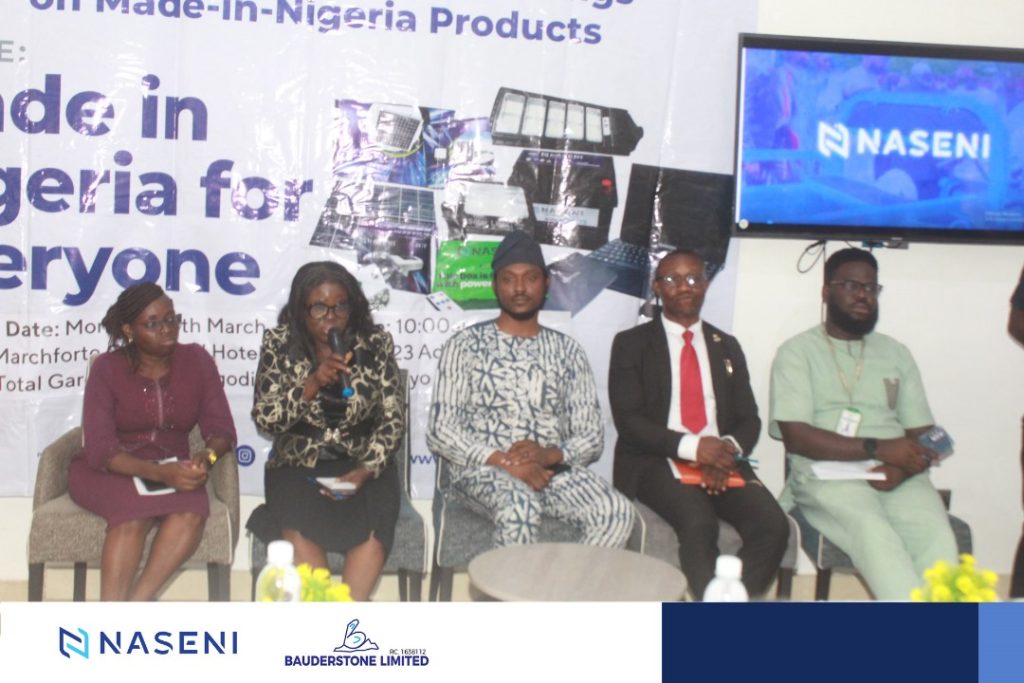
By Adeola Badru
The National Agency for Science and Engineering Infrastructure (NASENI) has reaffirmed its commitment to enhancing local manufacturing and driving Nigeria’s industrial growth.
The agency made this known yesterday during a strategic focus group meeting on Made-in-Nigeria products held in Ibadan, the capital of Oyo State.
The event brought together industry leaders, policymakers, and entrepreneurs to address challenges and uncover opportunities in the manufacturing sector.
Under the theme: “Made in Nigeria for Everyone,” the meeting served as a platform to discuss strategies for improving product quality, overcoming production hurdles, and expanding market access for Nigerian goods.
At the forum, the acting Managing Director of the Prototype Engineering Development Institute, Mr Ahmed Hamzat, emphasized the agency’s focus on strengthening Nigeria’s industrial base through a three-pronged agenda: creation, collaboration, and commercialization.
He highlighted NASENI’s role in promoting self-reliance, wealth generation, and job creation.
“By investing in research and development, we provide engineering solutions for critical sectors such as agriculture, transportation, construction, and power,” Hamzat stated.
He assured attendees that NASENI is dedicated to helping local manufacturers meet international standards and enhance their competitiveness in the global market.
“We’ve transitioned from research to manufacturing, yet many Nigerians remain unaware of the quality of our products. If our manufacturers meet the necessary standards, there’s no reason Nigerians shouldn’t support them,” he asserted.
Hamzat stressed the need for policies that offer financial assistance, improve access to technology, and cultivate an enabling environment for businesses.
“This meeting aims to raise awareness about the benefits of local production, encourage collaboration, and establish higher quality standards for Nigerian products,” he added.
The event also featured a panel discussion with industry experts and business leaders who tackled pressing issues affecting local manufacturing, including high production costs, access to funding, and ensuring Nigerian products meet global standards.
Panelists unanimously agreed that achieving industrial success necessitates robust policies, better financing options, and incentives for manufacturers to prioritise local production.
They emphasized the importance of business registration and connections with recognized organizations to attract investment and benefit from government subsidies for locally sourced materials.
In her remarks, Mrs. Ogunronbi Olanike, an Assistant Director with the National Agency for Food and Drug Administration and Control (NAFDAC), highlighted the agency’s efforts to support small businesses through its Micro, Small, and Medium Enterprises (MSME) skill initiative.
She noted that NAFDAC has streamlined product registration processes and intensified efforts against counterfeit goods.
She urged the public to report any such issues, as “Consumer complaints are crucial in combating the circulation of fake and substandard products. “
Also, in a remark, Senior Standards Engineer Oluwadare Bolumole from the Standards Organization of Nigeria (SON) pointed out that many Nigerian products meet required standards but lack public awareness.
“The issue isn’t quality; it’s perception. Nigerians must take responsibility for celebrating and promoting their own brands,” he said.
In the same vein, Mr. Jide Williams, a Deputy Director at the Oyo State Ministry of Trade, Investment, and Cooperatives, praised Governor Seyi Makinde’s administration for its support of small businesses.
He explained that the state government has collaborated with private sector partners to provide funding opportunities for SMEs.
“Recognizing that SMEs require financial support, we’ve established structures to assist them,” he stated.
During an interactive session, participants voiced concerns about infrastructure deficits, challenges in sourcing raw materials, and the public’s preference for foreign goods.
Calls were made for NASENI to partner with financial institutions to develop tailored funding solutions for local manufacturers.
Industry experts also highlighted the significance of branding, marketing, and quality control in building consumer trust and increasing demand for Nigerian-made products.
The event concluded with an exhibition of innovative Nigerian-made goods, offering stakeholders opportunities to explore potential partnerships and business expansion strategies.
Officials from NASENI reaffirmed the agency’s commitment to bolstering local industries, stating that fostering homegrown manufacturing is essential for Nigeria’s economic future.
Meanwhile, stakeholders expressed optimism that with sustained investment and effective policies, Nigeria’s manufacturing sector can thrive, creating jobs and stimulating economic growth. They said that prioritizing local production will position Nigeria as a significant player in the global industrial market.
The post NASENI wants local manufacturing strengthened to drive economic growth appeared first on Vanguard News.








